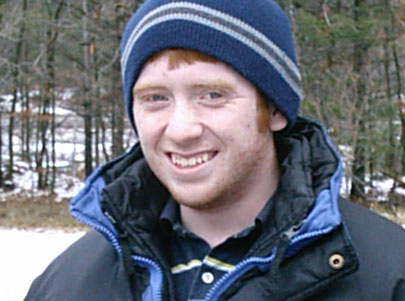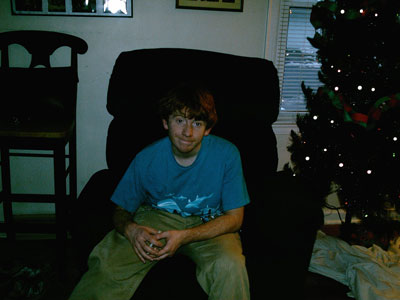Dan's Story Part I

My Life with SPD
I have all three types of modulation disorders (defensiveness, under-responsiveness, and seeking) that affect all five of my `far' senses, as well as the internal senses of vestibular, proprioceptive, and interoceptive. I also have Sensory Discrimination Disorder and every known Sensory Based Motor Disorder (both dyspraxia, and postural disorder). To my knowledge, I have no other disorders. No autism, no ADHD, just sensory issues.
The Early Years
My parents knew there was something different about me before I was born. Through a stressful pregnancy, prolonged labor, and three weeks of premature contractions, my mother had to also endure a C-section to give birth to me. From the moment I left the womb, my mom knew I was going to need a lot of extra support and help in life. She knew something was wrong, but had no idea what it was, and was determined to find out.
During the first year, my mom continued to observe my behavior. I couldn't handle public places well, couldn't be fed around my siblings, couldn't feel or control my mouth or jaw and was a very picky eater. I was very clingy but avoided being touched, and was distressed by loud sounds and appliance noises. I had very low muscle tone and would let things fall right out of my hand. Preferring to be left to play alone, I wasn't a natural explorer and had difficulty with changes and transitions. I had poor balance and posture and wouldn't catch myself when I fell down.
I loved to run and spin in circles (once I eventually learned to walk), and would watch the same movie over and over again, much to the agitation of my siblings. I would break everything I used, when I could actually keep my grip on it, and even obtained the nickname "Demolition Dan." I failed to hit most developmental milestones even though I appeared intellectually gifted. I could just keep going, but there's way too much to mention here.
An Answer?
A friend of my mother had been searching for years to find answers for her own son, who was four and had many 'unusual' behaviors. They came across an occupational therapist that told them about Sensory Integration Dysfunction (SID). Her son was diagnosed with SID and started treating him. After observing me, now at 14 months, she noticed that I acted a lot like her child had when he was that age. Having just found the answer for her son, there was no way she could keep it a secret. She had to tell my mom - and quick.
Scared but hopeful, my mom decided to take me to an OT in search of a diagnosis. She tried as hard as she could to get my evaluation insured, but the company wouldn't budge. She eventaully had to take me in for the evaluation anyway, and I was diagnosed with SID on my first visit to her office. It was 1989, and I was only 18 months old. For my mom, it was the answer she had needed. It came at a great time, as I was really beginning to suffer, and had just been diagnosed as Failure to Thrive.
OT in the Early Years
I received occupational therapy for the next 18 months, twice a week. My parents began to see improvements quickly. After a month or so, I was able to eat a lot better, and was able to gain badly needed weight. I loved OT. At first, it was terrifying to me, but over time, I began to grow to trust and love my therapist. I worked with her and continued to get better, bit by bit. I became happier and more confident, and even began to catch myself when I fell. Unfortunately, my therapy had to be cut short. My mom became pregnant again, and there was no way she could continue to take me. In the mean time, I was enrolled in several other programs recommended by my OT.
On her own to help me, my mother had few resources available. There were no books for her to read, no support groups for her to join, and this is way before Google. She was often unsure of what to do, and just relied on her instincts to figure out how to help me with my sensory issues. I still had to deal with many problems during this time. I had a very limited palate, able to eat so little I needed to be hospitalized once.
Eventually, I was able to return to OT in 1992, and I continued to go once each week until 1994. My SPD hadn't gone away, but things had gotten a bit more manageable. I had gotten to the point where I was comfortable enough to go over a friend's house to play. I was getting better, but eventually, and my parents couldn't afford any more sessions without insurance. A lot of chaos and issues arose in my family for the next several years, and with hardly any knowledge of my issues, everyone eventually forgot about my SID.
The Middle Years
At School - Without OT
Knowing that my issues would likely lead to difficulty in the classroom, my mom had me evaluated to see if I could recieve some sort accomodation from the schools. I was seen by a multi-disciplinary team, who re-affirmed my diagnosis of SID, but they could see nothing else wrong, so because I had no other diagnosis and SID was definitely not considered legitimate, I was enrolled in school and received no special assistance from the school.
I had a lot of difficulties in elementary school and kindergarten. With all the previously mentioned issues, constant headaches, motion sickness, and a lot of other new issues, I attended school as a social outcast. I had a ton of anxiety, and a growth delay. I was the shortest kid in class, and with all my other noticeably awkward traits, I was the repeatedly the subject of teasing and bullying. Without a great understanding of the sensory disorder that lay at the root of my problems, my parents had me checked for OCD by a school psychologist. No diagnosis, no assistance, either.
For the most part, my early years were spent playing video games, writing, and reading all day. I failed at sports, even though I participated. I played baseball for many years, only to never get a hit and be repeated humiliated and embarrassed. I tried swimming, but the very feel of the water on my face was that of a great fire, burning me badly. I was slow and clumsy, and got to the point where I not only expected to be picked last, but got mad when I wasn't the worst. Long story short, I always preferred being sedentary. I was able to form a couple friendships in elemantary school, but most of those ended in tears before I reached middle school. I couldn't participate in the activities my friends wanted me to, and they were embarrassed to be seen with me.
Middle School and a Glimpse of Hope
Just before getting to middle school, I had discovered the sport of hockey. It was the first and only sport I was actually good at and wanted to play. While playing, I was unknowingly working on several coordination, balance, and motor issues I had as well. I also started playing trombone, which was helpful for my oral issues, and delivered a daily paper route, which was an integral part of my daily routine.
The middle school was advanced and rigid, but had a good balance between activity and academics. I was really quiet at first, as is usual for me, but instead of teasing me, my classmates surprised me by actually expressing concern for me. I stayed kind of an outcast, not knowing how to be accepted even when I was, but I was able to interact with them. For the first time in my life, I actually liked going to school.
While I was there I was one of their top students and finished in the top rankings at the school-wide geography bee my sixth grade year. I became very pre-occupied with archives and historic facts and numbers. I memorized statistics and was able to recite every NHL Stanly Cup winning team in order from 1943 to date. and compete with others in contests of knowledge.
Later Years
High School and College
After three good years of middle school, I went to a public high school. My parents had tried to get me into a private high school, but couldn't afford it. I went to the public school and spent the first year silently observing and hardly speaking to anyone in the building. It was chronic stress and sensory overload. The building was load and cold, and the students were unruly. It was chaotic, and felt like a prison. It was truly like walking through a battlefield every day.
After almost a year of this, my SPD worsened and became unbearable. I got very sick. It lasted ten months and I spent every day feeling like was going to vomit, even though I never did. I couldn't eat, and lost nearly one third my body weight. I saw doctors who could find nothing wrong, and went through a summer and two semesters, spanning ten months, like this. I eventually slipped toward depression and started seeing a psycho-therapist, who couldn't really understand what I was going through or do a whole lot to help. Eventually, it was discovered that I horrible digestive issues. After nearly a year, my problems began to clear.

The next year went well, but then trauma set in again with the loss of my grandfather and my younger brother slipping into a bad mental illness. He was diagnosed with Bipolar Disorder and went through a year of drug alterations and all kinds of issues. I again became incredibly lethargic, stessed out, and lost interest with just about everything. Inspite of that, I managed to do well in school, but graduated just short of honors, even though I had been expecting a high GPA entering high school.
The following year, I went to a community college a started working as a cashier at a small grocery store. I started driving at 18, even though I still had huge anxieties about it and had no desire to drive anywhere. I had never been on a date. The few friendships I had formed in high school had all left to college elsewhere and we stopped communicating with each other.
I slipped even further into depression that next Fall, as my childhood dog died and I lost the last hopes in things getting any better for me. Things just kept getting worse. I eventually had reached the breaking point. I could go no further. Living alone and seeing no way out, I began to loose hope that things could get better. I began to give up on life. I had to find an answer, and quick.
Finding the Answer I Needed
In January 2008, I remembered that I had been diagnosed with something that was called SID. I was told it was kind of like ADD, but wasn't. I wasn't sure what that meant. In fact, I realized, I had no idea what SID even was, so I decided to search for it on the internet. What I found there changed my life and I can certainly say it was for the better. According to the websites, SID was actually now called Sensory Processing Disorder, or SPD. As I continued to read, I continued to find out how much this forgotten diagnosis pretty much described my life.
Continue reading in Dan's Story Part II >